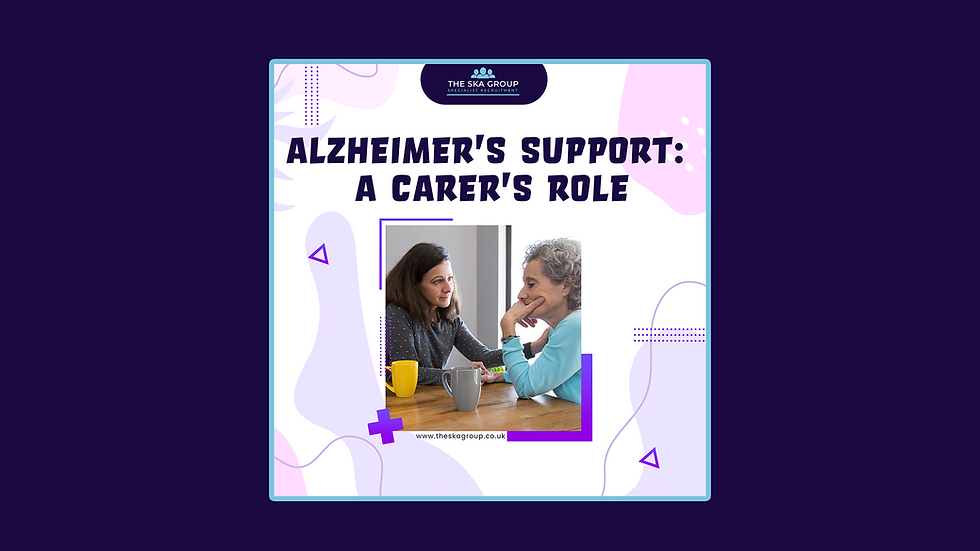Caring for and Supporting People with Diabetes
- Emily

- Jun 12, 2025
- 3 min read
Diabetes is a lifelong condition that affects how the body regulates blood sugar. In the UK alone, over 4 million people live with diabetes, and many of them rely on carers—whether family members, support workers, or professional healthcare staff—for daily support.
For care professionals, understanding the condition and offering personalised, compassionate care can significantly improve the quality of life for someone managing diabetes.
1. Understanding Diabetes: Type 1, Type 2, and More
There are two main types of diabetes:
Type 1: An autoimmune condition where the body doesn’t produce insulin. This type is often diagnosed in children or young adults and requires lifelong insulin therapy.
Type 2: More common, especially in adults. The body either doesn’t produce enough insulin or becomes resistant to it. This type is often managed through lifestyle changes and medication.
In addition, some people may have gestational diabetes during pregnancy or other rarer forms of the condition. As a carer, it's important to understand which type your client or loved one has, as each type has different treatment needs and daily routines.
2. Monitoring and Medication
Monitoring blood glucose levels is a critical part of diabetes care. Many people with diabetes use blood sugar monitors or continuous glucose monitors (CGMs). Carers may assist with checking levels, logging results, and recognising patterns that may require medical attention.
Depending on the type and severity of diabetes, the individual may require:
Oral medication
Insulin injections
Insulin pumps
Supporting someone in sticking to their medication schedule is key to managing their condition safely. If you’re unfamiliar with how to assist, request training or advice from a healthcare professional.
3. Diet and Nutrition Support
Food plays a huge role in blood sugar control. As a carer, you might help with:
Preparing balanced meals that include complex carbohydrates, lean proteins, and healthy fats
Encouraging regular meal times
Understanding portion sizes and carbohydrate counting
It's not about restricting treats entirely but supporting mindful, informed choices. Collaborate with a dietitian when possible to create meal plans that fit the individual's needs and preferences.
4. Recognising Warning Signs
Being aware of warning signs can prevent complications:
Hypoglycaemia (low blood sugar): Symptoms include shakiness, sweating, confusion, irritability, and dizziness. In severe cases, it can cause seizures or unconsciousness. Offer fast-acting carbs like juice or glucose tablets if symptoms appear.
Hyperglycaemia (high blood sugar): Symptoms include increased thirst, frequent urination, fatigue, and blurred vision. This may require medication adjustments or medical support.
Always have an emergency plan and know when to contact medical help.
5. Emotional and Mental Wellbeing
Living with a chronic condition can be emotionally draining. People with diabetes may experience anxiety, depression, or "diabetes burnout." As a carer, offering emotional support is just as important as physical care.
This can be done by encouraging open communication, listening without judgment and helping them access counselling services or peer support groups if needed. A simple cup of tea and a chat goes a long way.
6. Encouraging an Active Lifestyle
Physical activity helps manage blood sugar and improve mood and energy. Carers can support by:
Encouraging daily walks or light exercise
Assisting with physiotherapy routines
Helping build movement into daily routines (like gardening or dancing)
Always ensure activities are safe and approved by a healthcare provider.
7. Promoting Independence
Whenever possible, support the person in managing their condition independently. This includes:
Letting them take the lead with testing and medication
Encouraging them to speak up during medical appointments
Helping them build confidence in making healthy choices
Empowering someone with diabetes strengthens their sense of control and wellbeing, increasing the effectiveness of the care services provided.
8. Staying Informed
Diabetes care evolves. Stay up to date by:
Attending training sessions or webinars
Following reputable organisations like Diabetes UK
Learning about new devices, medication, and approaches
Better knowledge leads to better care.
Final Thoughts
Caring for someone with diabetes involves more than routines and monitoring—it’s about building a partnership based on trust, understanding, and empathy. Whether you’re a professional care worker or supporting a loved one, your role makes a huge difference in their day-to-day life and long-term health.
At The SKA Group, we believe great care begins with education and compassion. By taking the time to learn and adapt, carers can offer meaningful support that truly improves lives.




Comments